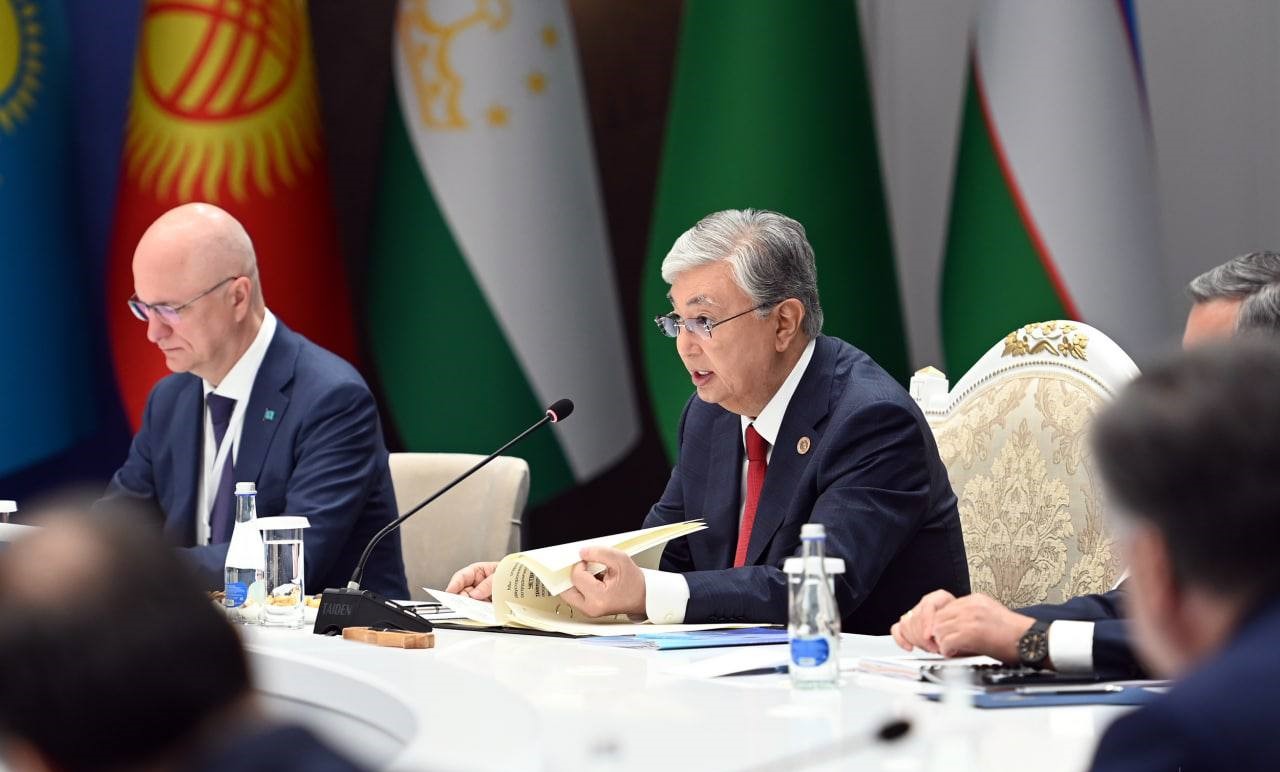Kazakh President Kassym-Jomart Tokayev has called on the Central Asian countries to join efforts against attempts to “split” their relations.
“We must unite to oppose any attempts to divide peoples and to split our relations by fomenting interstate and interethnic discord,” President Tokayev said while addressing a summit of the five Central Asian leaders in the Kyrgyz resort city of Cholpon-Ata on July 21.
He also highlighted “an acute information hunger” in local media in terms of coverage of life in the region’s countries and offered to reverse this trend.
In addition, as part of the summit, President Tokayev expressed his country’s readiness to provide “all possible assistance” in resolving the issues of border delimitation in Central Asia.
“Every shot fired at interstate borders echoes heavily not only in the countries involved but also throughout the region. On the contrary, it is in the current crisis conditions that our states must demonstrate an example of the civilized, responsible overcoming of contradictions,” he stressed.
Kazakhstan’s president also urged his regional counterparts to make active use of the new Kazakhstan-Turkmenistan-Iran railway line, which was launched in June 2022 to connect the landlocked Central Asian republics with the Persian Gulf.
President Tokayev described the railway line as the shortest route between East Asia and the countries of the Persian Gulf saying that this new logistics solution makes it possible to cover over 6,000 kilometers in just 12 days. According to him, the Kazakh seaports of Aktau and Kuryk can provide access to the markets of the Middle East and Europe, and Turkmenistan, which is successfully developing the infrastructure of Turkmenbashi port, “shares the same position.”
“In the new geopolitical realities, the role of our region in promoting and developing transcontinental trade is increasing rapidly. In these circumstances, Kazakhstan is actively developing the Trans-Caspian International Transport Route,” President Tokayev said, adding that the number of transported containers along the routes of this corridor has increased almost threefold, to 25,000, since 2017.
The president further said that Kazakhstan was actively cooperating with Uzbekistan to launch the “Darbaza-Maktaral” railway, which, according to him, will double the traffic capacity and reduce the time of cargo transportation by 1.5 times.
On July 21, the leaders of Kazakhstan, Kyrgyzstan, and Uzbekistan, three of the five Central Asian republics, signed an agreement on Friendship, Neighborliness, and Cooperation for the Development of Central Asia in the 21st Century.
Tajikistan and Turkmenistan refused to sign the agreement, saying they would first “complete all domestic procedures” before committing to the agreement. However, Tajik and Turkmen officials offered no time frame for when the “procedures” will be done or what exactly needs to be done.
Turkmenistan is not a member of any of the major regional groups, such as the Commonwealth of Independent States, the Collective Security Treaty Organization, the Eurasian Economic Union, or the Shanghai Cooperation Organization.
Referring to the agreement, Kyrgyz President Sadyr Japarov said that he was confident that this “important document will have a positive impact on the processes of further rapprochement between the countries of our region and the consolidation of joint efforts in overcoming emerging challenges and threats of our time.”
A list of documents signed at the summit also included a decision by the Kazakh, Turkmen, and Uzbek leaders to extend the powers of the president of the International Fund for Saving the Aral Sea; a joint statement of the leaders of the Central Asian states; a blueprint for cooperation between Central Asian states bilaterally; a regional program called “Green agenda for Central Asia”; and a two-year road map for developing cooperation in 2022-2024.







 The number of evacuees from flooded areas in Kazakhstan has reached 97,852 people, including about 32,856 children since March 27.
The number of evacuees from flooded areas in Kazakhstan has reached 97,852 people, including about 32,856 children since March 27.
 The Islamic holy month of fasting, Ramadan comes to an end this week with the celebration of a joyous festival called Eid (meaning “festival” in Ar...
The Islamic holy month of fasting, Ramadan comes to an end this week with the celebration of a joyous festival called Eid (meaning “festival” in Ar...
 Iran's senior military leaders described the drone and missile attack on Israel on April 14 night as “successful".
Iran's senior military leaders described the drone and missile attack on Israel on April 14 night as “successful".
 Azerbaijan officially unveiled the logo for the upcoming 29th session of the Conference of the Parties to the United Nations Framework Convention o...
Azerbaijan officially unveiled the logo for the upcoming 29th session of the Conference of the Parties to the United Nations Framework Convention o...



